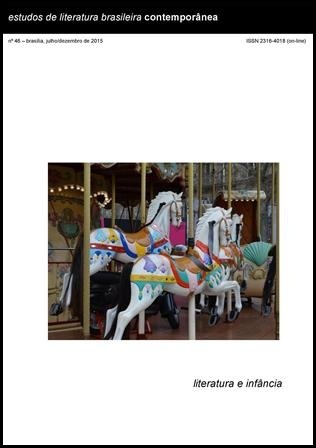Literatura e infância:
entre filosofia, história e “despropósitos”
DOI:
https://doi.org/10.1590/2316-40184611Resumo
Neste estudo, sublinham-se algumas reflexões no âmbito da relação entre literatura, infância e experiência. De modo específico, almeja-se pensar sobre a dimensão filosófica da linguagem em diálogo com obras literárias contemporâneas que trazem ao primeiro plano a infância. Por um lado, opera-se uma reflexão sobre a relação entre ficção e infância, com especial ênfase na produção protagonizada por personagens crianças e em sua capacidade de ver a realidade por outra perspectiva, de filosofar. Por outro, enfatiza-se o exame de estratégias literárias capazes de causar estranhamento em relação ao caráter descritivo e comunicativo da linguagem cotidiana. Para desenvolver o exame, privilegiam-se as seguintes obras: Exercícios de ser criança (1999) e Memórias inventadas: a infância (2003), de Manoel de Barros.
Downloads
Referências
AGAMBEN, Giorgio (2005). Infância e história: destruição da experiência e origem da história. Belo Horizonte: UFMG.
BAKHTIN, Mikhail (1994). Marxismo e filosofia da linguagem. São Paulo: Hucitec.
BARROS, Manoel (1999). Exercícios de ser criança. Rio de Janeiro: Salamandra.
BARROS, Manoel (2003). Memórias inventadas: a infância. São Paulo: Planeta.
BARROS, Manoel (2010). Poesia completa. São Paulo: Leya.
BENJAMIN, Walter (1984). Reflexões: a criança, o brinquedo e a educação. São Paulo: Summus.
BENJAMIN, Walter (1987). Obras escolhidas I: magia e técnica, arte e política. São Paulo: Brasiliense.
BENJAMIN, Walter (1933/1999). Experience and poverty. In: JENNINGS, Michael W.; EILAND, Howard; SMITH, Gary (Eds.). Walter Benjamin ”“ selected writings: 1927-1934. Harvard: Harvard College. p. 731-735. v. 2.
BOLLE, Willi (1989). Pensamento privilegiado e cultura de massas: tradição e modernidade em Walter Benjamin. Linha d’água, n. 6, p. 13-27.
GAGNEBIN, Jean Marie (1994). História e narração em Walter Benjamin. São Paulo: Perspectiva: FAPESP; Campinas: UNICAMP.
JOBIM E SOUZA, Solange (1994). Infância e linguagem: Bakhtin, Vygotsky e Benjamin. Campinas: Papirus.
JOBIM E SOUZA, Solange (1996). Re-significando a psicologia do desenvolvimento: uma crítica à pesquisa da infância. In: KRAMER, Sonia; LEITE, Maria Isabel (Orgs.). Infância: fios e desafios da pesquisa. Campinas: Papirus.
KONDER, Leandro (1988). Walter Benjamin: o marxismo da melancolia. Rio de Janeiro: Campus.
KRAMER, Sonia (1994). Por entre as pedras: arma e sonho na escola. São Paulo: Ática.
MURICY, Katia (1987). Benjamin: política e paixão. In: CARDOSO, Sergio et al. (Orgs.). Os sentidos da paixão. São Paulo: Companhia das letras.
SCHIAVONI, Giulio (1989). Frente a um mundo de sueño: Walter Benjamin y La enciclopédia mágica de la infância. In: BENJAMIN, Walter. Escritos: la literatura infantil, los niños y los jóvenes. Buenos Aires: Nueva Vision.
SILVA, Márcia Cabral da (2009). Infância: apontamentos sobre experiência e formação. In: JOBIM e SOUZA, Solange; KRAMER, Sonia (Orgs.). Política, cidade e educação: itinerários de Walter Benjamin. Rio de Janeiro: Contraponto: PUC-Rio.
VYGOTSKY, Lev Semenovich (1987). La imaginacion y el arte en la infância. México: Ediciones y Distribuiciones Hispanicas.
Downloads
Publicado
Como Citar
Edição
Seção
Licença
Autores que publicam nesta revista concordam com os seguintes termos:
a) Os(as) autores(as) mantêm os direitos autorais e concedem à revista o direito de primeira publicação, sendo o trabalho simultaneamente licenciado sob a Licença Creative Commons de Atribuição-Não Comercial 4.0, o que permite o compartilhamento do trabalho com reconhecimento da autoria do trabalho e publicação inicial nesta revista.
b) Os(as) autores(as) têm autorização para assumir contratos adicionais separadamente, para distribuição não-exclusiva da versão do trabalho publicada nesta revista (ex.: publicar em repositório institucional ou como capítulo de livro), com reconhecimento de autoria e publicação inicial nesta revista.
c) Autores têm permissão e são estimulados a publicar e distribuir seu trabalho on-line (ex.: em repositórios institucionais ou na sua página pessoal) após o processo editorial, já que isso pode gerar alterações produtivas, bem como aumentar o impacto e a citação do trabalho publicado (Veja O Efeito do Acesso Livre).
d) Os(as) autores(as) dos trabalhos aprovados autorizam a revista a, após a publicação, ceder seu conteúdo para reprodução em indexadores de conteúdo, bibliotecas virtuais e similares.
e) Os(as) autores(as) assumem que os textos submetidos à publicação são de sua criação original, responsabilizando-se inteiramente por seu conteúdo em caso de eventual impugnação por parte de terceiros.


